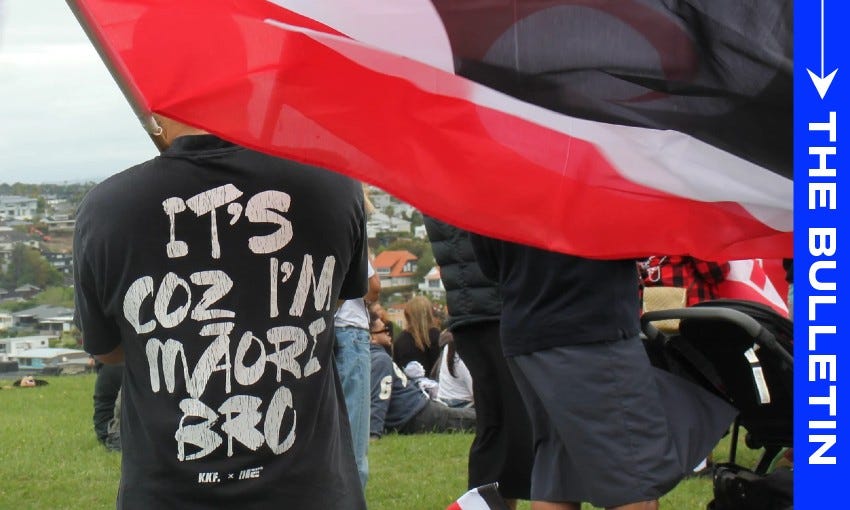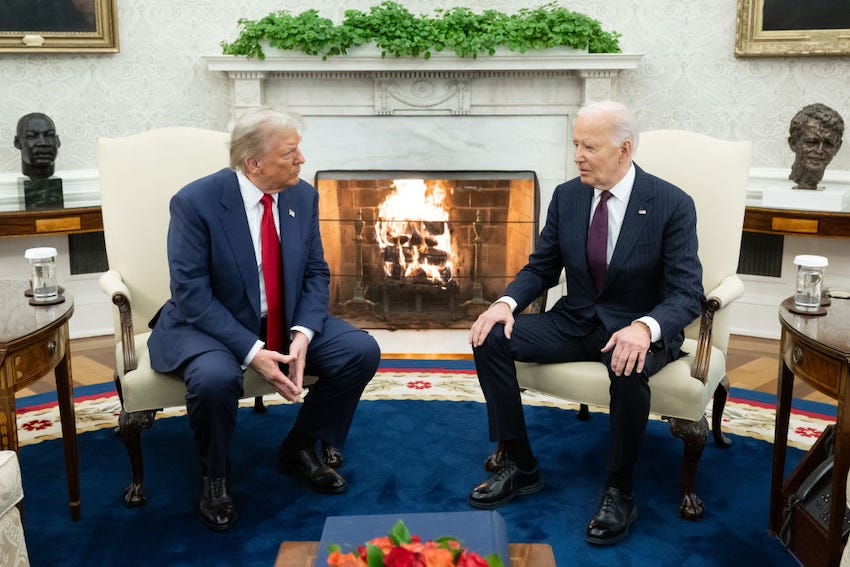On the frontlines of Hīkoi mō te Tiriti
Thousands converged on Auckland, the day before the first reading of the controversial Treaty Principles Bill.
Mōrena, and welcome to The Bulletin for Thursday, November 14.
In today’s edition: Paul Goldsmith says he hasn’t given up on having the Fair Digital News Bargaining Bill in place by the end of the year, Donald Trump has been welcomed back to the Oval Office, and Labour claims “cover-up” as weekly reporting on benefit numbers cancelled. But first: the Hīkoi mō te Tiriti passed through our biggest city and The Spinoff was there to witness it.
Auckland’s wobbly bridge welcomes hīkoi
Thousands of protesters converged on Auckland yesterday, crossing the harbour bridge before splitting into two groups: one headed to Bastion Point, the other to Ihumātao. Extraordinary drone footage shared by the Herald illustrates the size of the Hīkoi mō te Tiriti, which is only expected to grow in the coming days. The Spinoff’s Lyric Waiwiri-Smith was among the group and described the mood as the protest made its way across the wobbling harbour bridge.
If you looked at your feet or the barrier between the bridge’s outer and inner lanes, you could see the ground beneath you move. So it felt better to look at the signs around instead: “Kill the bill”, “whaka round, find out”, “Seymour, say less”.
There were also the constant honks from the hundreds of cars that passed us. Many waved the tino rangatiratanga flag, others stuck out their thumbs and some threw a mana wave, which were always enthusiastically returned. They represented the many people who clearly support the kaupapa, but thanks to the responsibilities of work, family and, generally, life, their presence was needed somewhere else.
Today, the hīkoi heads to Hamilton. It will arrive in the capital on November 19.
A new generation
On the latest episode of The Spinoff’s politics podcast, Gone by Lunchtime, co-host Anabelle Lee-Mather noted how the hīkoi had resonated with a new, younger generation of activists and supporters. “The messaging, I think is really resonating with rangatahi, with kaumātua, with tangata tiriti. And I like that the message that's coming through is about… protection of the treaty, kotahitanga, unifying Aotearoa, all of those things. So it's impressive to watch.”
The consequence of attracting a younger generation is that school-age children want to attend. Some schools, criticised David Farrar for Kiwiblog, have encouraged or endorsed their students attending the hīkoi when it makes its way through their town. Act leader and associate education minister David Seymour warned school principals against allowing this, telling Newstalk ZB’s Heather du Plessis-Allan that it was more important for children to be in the classroom than marching the streets. “Principals are public servants required to show political neutrality,” he warned.
While the hīkoi is still making its way down through the top of the country, other parts of Aotearoa joined in support as well, reported The Spinoff’s Alex Casey from Christchurch. At least a thousand supporters turned out at the Bridge of Remembrance, signs at the ready.
As speakers continued to take the stage, that idea of unity shone through. Everyone was invited to have a little mihi with the stranger next to them, and thank them for coming. I chatted to Shavaughn, t-shirt emblazoned with the flag of the United Tribes of New Zealand, whose daughter was there to sing waiata onstage with her roopu from Te Kura Whakapūmau. “I’m standing right here because I’ve got a direct line to seeing her,” she beamed.
Treaty Bill set for first reading
Obviously, the main impetus for this nationwide protest is the government’s Treaty Principles Bill. It’s set to have its first reading in parliament later today, or, as RNZ’s Anneke Smith described it – today is D Day for the Treaty Bill. As if the political headache over the bill couldn’t get more intense, a group of 42 prominent kings counsel have now joined public opposition to the bill, reported Thomas Manch. In a letter addressed to the prime minister and attorney-general, the lawyers argued the bill would “have the effect of unilaterally changing the meaning of te Tiriti and its effect in law, without the agreement of Māori as the Treaty partner”.
One person who won’t be present for this afternoon’s debate is prime minister Christopher Luxon, who has maintained his opposition to the bill while reiterating that, as per the coalition agreement, his party’s MPs will vote for it at first reading only. Luxon has headed to the Apec leaders meeting in Peru – timing that the Herald’s Claire Trevett (paywalled) suggested was more than coincidental. On Monday, reported Stuff, the prime minister issued arguably his strongest condemnation yet of the bill, saying it was “divisive” and a “very simplistic interpretation of the Treaty of Waitangi”.
Not everyone is convinced the government will indeed kill the bill after first reading, reported Te Ao Māori News, with one protester telling the outlet it was “lip service” and questioning whether Luxon may choose to hide behind the other “two heads of the taniwha”.
‘Media bias’?
The bill’s architect, David Seymour, has taken issue with his proposed law being described as “divisive” – but has seemingly stayed silent on his boss’s decision to label the bill that way. In an email to supporters yesterday to drum up support, Seymour claimed “media bias” after TVNZ Breakfast host Jenny-May Clarkson called the bill divisive at the start of an interview earlier in the week. “After we introduced the Treaty Principles Bill into parliament last week, the media seems to have had something of a collective meltdown,” the supporter email said.
Act and Seymour have shared the interview several times online in recent days. As Newsroom’s Tim Murphy noted on Twitter, “Act still thinks 'divisive' is a media word, from a vocal minority”. The days ahead may reveal who is right.
Support longform journalism in New Zealand at The Spinoff
Joel MacManus’s investigation into the urgent race to solve homelessness in Aotearoa is the kind of vital journalism that is impossible without funding from Spinoff members and donors. If it matters to you and you are able to, please donate or become a member today.
Has the beleaguered news bargaining bill hit another snag?
Media minister Paul Goldsmith says he hasn’t given up on having the Fair Digital News Bargaining Bill in place by the end of the year, reported Tom Pullar-Strecker for The Post, despite speculation the government has decided to park the proposed law. The bill was originally put forward by Labour but has been adopted, with tweaks, by two-thirds of the coalition government (Act has maintained its opposition). Intended to provide an overdue lifeline to local media outlets from big social media companies, it has provoked the wrath of Google which has threatened to stop sharing links to local news websites should the bill progress.
As Pullar-Strecker reported, Goldsmith said he was still “working towards” having the bill in place by year’s end. But the Herald’s Shayne Currie earlier reported (paywalled) the government was wavering, citing unnamed sources that claimed “apparently it’s over”. Watch this space.
Trump and Biden meet, promise ‘peaceful transition’
President-elect Donald Trump has made his first visit to the White House since winning reelection last week. He met with outgoing president Joe Biden in the Oval Office, as is traditional after an election defeat (though a courtesy Trump did not extend to Biden in 2020). As Al Jazeera reported, Biden promised a “peaceful transition” of power in January, with Trump responding: “Politics is tough, and in many cases it’s not a very nice world. It is a nice world today and I appreciate very much a transition that’s so smooth, it will be as smooth as it can get.”
In the past 24 hours, Trump has started to publicly reveal some key appointments for his new administration. As MSNBC summarised, they include Trump loyalists such as Mike Waltz and Elise Stefanik, along with former Fox News host Pete Hegseth.
Listen: Mass cuts at TVNZ – but are they enough?
Glen Kyne joins Duncan Greive to discuss TVNZ’s newsroom restructuring, Frances Cook’s fallout with NZME, and the implications of Trump’s election on big tech and legacy media.
Click and Collect
The government’s fast-track bill passed its second reading in parliament yesterday. Shane Jones said it was a “day of light” and the law change would remove the “obstructiveness that has impeded the development of our economy”.
The Crown observer appointed to keep an eye on Wellington City Council was not physically in the capital yesterday on his first official day in the role.
Christopher Luxon shares his tips for Elon Musk as Donald Trump announces a new role for the Tesla boss.
New Zealand's population growth from migration fell to a 10 year low for the 12 months to September, excluding the Covid-related travel restriction hit 2021 and 2022 years.
Labour claims “cover-up” as weekly reporting on benefit numbers cancelled.
Despite its dwindling locations and reduced service, NZ Post remains a pillar in every community, writes Hera Lindsay Bird. Carl Shuker shares his favourite reads and other stories in The Spinoff Books Confessional. Gabi Lardies and I checked out the new Lord of the Rings musical in Auckland and left buzzing. Gabi Lardies also goes behind the scenes on the brand new season of acclaimed comedy show Camping. Shanti Mathias looks at a new report that shows how those receiving benefits or working for minimum wage often can’t pay for food after the cost of fixed expenses.
That’s it for today. Thanks for reading and see you back here tomorrow.
Want to get in touch? Join the conversation in the Substack comments section below or via email at thebulletin@thespinoff.co.nz if you have any feedback on today’s top stories (or anything else in the news).
If you liked what you read today, share The Bulletin with friends, family and colleagues.

















Maybe they had to cancel weekly reporting on benefit numbers because the people who would have done it were made redundant, who knows